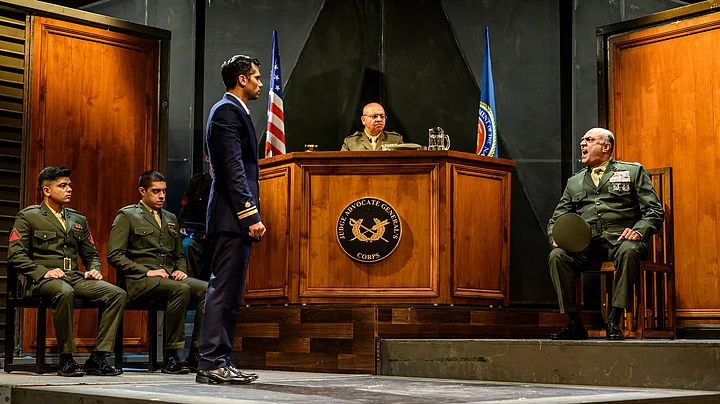“I did my job and I am proud of it,” proclaims Col. Nathan Jessep, who has the unenviable task of protecting Guantanamo Bay, a part of Cuba occupied by USA.
Col. Jessep is one of the key characters in the Aaron Sorkin-written play, A Few Good Men, with which the Aditya Birla Group initiative, Aadyam Theatre, opened its fifth season of theatre. Sorkin’s play, which was made into a very successful Hollywood film in 1992 after a stage show in 1989, revolves around the death of PFC. Santiago, a US marine officer in Guantanamo.
Sorkin’s play, which was made into a very successful Hollywood film in 1992 after a stage show in 1989, revolves around the death of PFC. Santiago, a US marine officer in Guantanamo.
Going against the strict code of conduct followed at the naval base, PFC. Santiago wrote letters about an illegal firing across the fence, into Cuba, by an American mariner. His sudden death, thereafter, by gagging is attributed to his colleagues LCPL. Dawson and PFC. Downey. But as the duo’s defence lawyers, Lt. Cdr. Joanne Galloway (played by a suitably crisp Ira Dubey) and Harvard graduate Lt. Kaffee (Neil Bhoopalam brings many shades to his character) investigate the case, they find it is not as simple as that.
Are two greenhorns being made scapegoats? While PFC. Downey is a raw recruit who hasn’t outgrown his favourite comic book hero Spiderman, LCPL. Dawson is a proud soldier who will not exchange his honour for freedom by speaking an untruth in court. As the plot unfolds, it would appear they are convenient pawns being used in a larger game-plan hatched by Col. Jessep. But Jessep, himself, is merely doing a job. “You f*** guys, you have no idea what it is to defend your nation,” he throws at the defence lawyer, his voice dripping with contempt.
The Nadir Khan-directed play resonates with an Indian audience familiar with the compulsions of war, the outcome of political policies on a long-festering problem called Kashmir.
The Nadir Khan-directed play resonates with an Indian audience familiar with the compulsions of war, the outcome of political policies on a long-festering problem called Kashmir. While young boys barely out of their teens giving up their lives at the altar of patriotism, has become a routine affair on our borders, it is no easier for their seniors in uniform. As Col. Jessep asks Lt. Kaffee, “What do you know what it is to eat breakfast, with the Cubans just 81 yards away from you?”
Men in uniform are indoctrinated to follow the military code of conduct. Their allegiance is to their unit, corps, God and country, as reiterated through the play. They don’t question, they merely follow the orders of their superiors. Says one of the characters in the play, “We follow orders or people die.” It is a watertight hierarchy, with the buck stopping at the top. That is why Col. Jessep is brought in as witness in the case trying Dawson and Downey. Outraged at being grilled by a mere lieutenant, Jessep resorts to arrogance; thus, unwittingly, playing into the defence lawyer’s hands. “Yes,” he thunders, “I did issue Code Red orders!” Code Red was an extrajudicial punishment, at the base, meted out for any form of indiscipline, including something as minor as unkempt hair. In Santiago’s case it led to death.
Played by veteran actor Rajit Kapur, Col. Jessep has all the characteristics of a tragic hero, arousing both pity and dislike.
Kapur, who essays Jessep to perfection through his booming voice and pompous body language, concurs, “Yes, Col. Jessep is essentially doing his job, which is a tough one. He is setting an example and believes in toughening his men, and he thinks his way is the right way. One could ask, ‘Where do you draw the line? To what extent do you go when doing your job? Who comes first: The country or the individual?’ We may strive to do our duty to the best of our ability, but sometimes we need to introspect whether the needs justify the end. Is there a need to find the right balance?”
There are no clear black and white answers to these questions, with military discipline and the extent to which it can go being a grey area. But grey as the subject may be, it is treated with black humour, with a crackling exchange of dialogues between its protagonists.
There are no clear black and white answers to these questions, with military discipline and the extent to which it can go being a grey area. But grey as the subject may be, it is treated with black humour, with a crackling exchange of dialogues between its protagonists. Whether it is Lt. Cdr. Galloway (introduced by a patronising male officer as ‘a harmless, neurotic person’) shaking up the laidback defence lawyers with her sharp comments, or Col. Jessep and Lt. Kaffee trading insults, the play has a running undercurrent of biting sarcasm that makes it very stimulating. And entertaining.
(At The Quint, we question everything. Play an active role in shaping our journalism by becoming a member today.)
